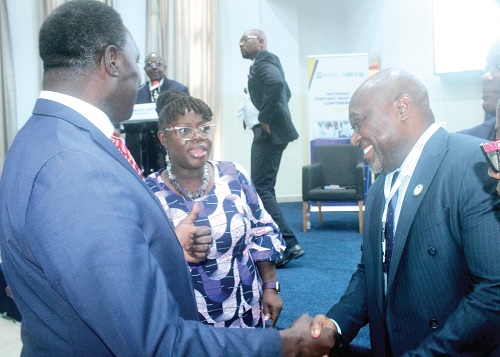The Minister of Education, Dr Yaw Osei Adutwum, has asked tertiary educational institutions to brace themselves to respond to the secondary education transformation in equal measure so as not to derail the gains made at the pre-tertiary level.
He said with some senior high schools (SHS) developing drones and other high technology equipment, tertiary institutions must be prepared to put in place facilities and measures that would accelerate their academic progress and not reverse the clock.
"Tertiary institutions must work with pre-tertiary institutions to create an accelerated curriculum that would allow one to do advanced placement at high school.”
"It is to ensure that those students who are smart have the opportunity to advance themselves and not come to the university and be repeating courses that they have done at the high school," Dr Adutwum said at the opening of the maiden national tertiary education conference in Accra on Tuesday.
The three-day premier forum brings together more than 400 participants, comprising university leaders, scholars, researchers, policy makers, students, industry captains and other critical stakeholders.
It is to enrich diversity of perspectives that set the stage for dynamic exchange of ideas and meaningful collaboration.
The education minister said it would be highly disappointing for students with such technology to be enrolled in a tertiary institution which relies on manual materials.
Higher education
Speaking on the theme: “Transforming tertiary education in Ghana: Dialogue, policy and practice," Dr Adutwum said higher education improved human capital development through advanced knowledge acquisition, skill and higher competencies.
"It brings about innovation and research and of course new products and ideas are generated to transform society.”
"High education improves social mobility and cultural enrichment and positions us to be globally competitive," he said.
According to him, research has shown that higher education was critical to national development and transformation.
"It's a known fact for example, that a 10 per cent increase in gross tertiary enrolment ratio, leads to two to four per cent increase in Gross Domestic Product (GDP) growth and 5.3 per cent increase in labour productivity.
"So, when you increase gross tertiary enrolment ratio, you lay a foundation for socio-economic transformation. Therefore, government is determined that by 2030 we would have a gross tertiary enrolment ratio of 40 per cent," he said.
He expressed regret that most middle-class parents were unwilling to enrol their wards at government/public institutions, expressing the hope that the trend would change.
Regulation
A former Vice-Chancellor of the University of Ghana, Legon, Prof. Ernest Aryeetey, expressed worry at the blurred line between the regulators and managers within the educational sector.
He said for instance, the Ghana Education Service, which was mandated to regulate the educational system, has metamorphosed into a manager dealing with recruitment and other appointments as well as performing its regulatory role.
Prof. Aryeetey said in the occasion of a conflict between the two, it would be difficult to find a neutral arbiter to handle the situation.
On higher education, the economic profession said any country that played down on education did so at its on risk.
Academia/Industry
The Vice-Chancellor of the University of Ghana, Prof. Nana Aba Appiah Amfo, restated the need for academia and industry to collaborate to ensure employability of graduates.
She said promoting dialogue among key stakeholders was key in ensuring that programmes of the universities were not done in isolation.
While tackling that, the VC said it was necessary for such dialogues to transition into action.
For his part, the Director-General of the Ghana Tertiary Education Commission (GTEC), Prof. Ahmed Jinapor Abdulai, said in the face of global challenges, the GTEC was committed to fostering a robust tertiary education system that was resilient, adaptive and future-ready.
He said the theme encapsulated the core objective of bridging the gap between theoretical policy formulation and practical implementation.

